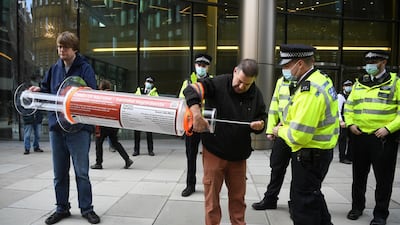Covid-19 vaccination programmes in eastern Europe are being hampered by church leaders condemning the inoculations as anti-religious, it has been reported.
Prominent church figures in Romania, Greece and Poland have called on people to refuse the Pfizer/BioNTech and Moderna drugs, which they incorrectly claim are developed from aborted foetal cells.
The unfounded allegations have been made by the so-called "anti-vax" movement, although it is not yet known how many people have rejected the vaccine as a result.
At a time when most Europeans are desperate to get vaccinated to protect them from the lethal virus, a Romanian Orthodox Church leader called on his followers to ignore it.
"The thing that cures the most is praying, much more than any vaccine," Teodosie Petrescu, the Archbishop of Tomis said.
The cleric, who has defied government edicts on religious meetings, said: "I don't dare encourage anyone to get the vaccine… This is the only vaccine that has not been tested on animals and is being tested directly on humans; accidents have already happened."
There is currently no evidence of Covid vaccine "accidents".
The anti-vaxxers have attracted some religious figures to their cause by claiming – incorrectly – that scientists used foetal cell lines from abortions. Pfizer/BioNTech and Moderna’s vaccines are made from synthetic pharmaceutical products.
However, the false allegations have led a Romanian Orthodox sect to issue a statement against the inoculations. “We imperatively refuse this vaccine for religious reasons, but also because it has not been thoroughly scientifically tested,” it said.
The Romanians were joined by some in the Greek Orthodox Church, with the Bishop of Kythira allegedly calling on Christians to avoid the vaccines created by “the product of abortions”.
In the Catholic Church, a number of priests have raised objections to the vaccine on moral grounds, with Poland’s Ordo Iuris Institute, a religious legal foundation, telling people not to forget "important ethical questions”.
However, when both Pope Francis and retired pope Benedict publicly received the vaccine last week, objections among Catholics became muted.
Similarly, some senior religious figures in Greece and Bulgaria have encouraged people to take the vaccines, debunking the allegations around them.
Elsewhere in the Balkans, Serbia is attempting to inoculate its population at pace, using the Chinese Sinopharm vaccine. The country has received the first batch of one million doses.
In central Europe, Hungary is expecting a similar number of doses of the Sinopharm vaccine.
Meanwhile, the European Union said that it would inoculate 70 per cent of its adult population against coronavirus by June.
The announcement came as the bloc struggles with vaccination supply shortages and trails far behind Britain, the UAE, the United States and Israel in its vaccination programme.
EU health commissioner Stella Kyriakides said that the bloc's joint-buying strategy meant there were already enough doses to vaccinate 80 per cent of the EU's population of 450 million, although she admitted “vaccinations need to speed up”.
Ms Kyriakides said the current bottleneck of vaccines was due to "the worldwide shortage of production capacity", rather than a shortage of shots ordered by the EU.
She added that the EU was in “active discussion” with European governments about the possibility of "vaccination certificates" that would be recognised across member states.
Greece, whose economy relies on tourism, has already called for the use of such certificates.


